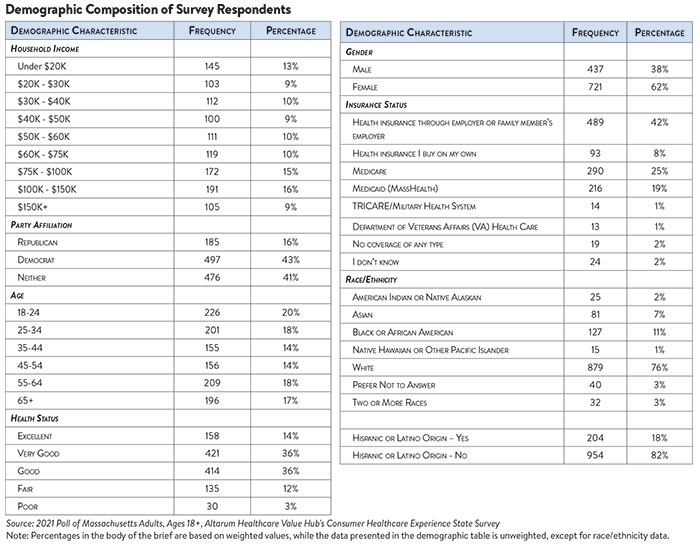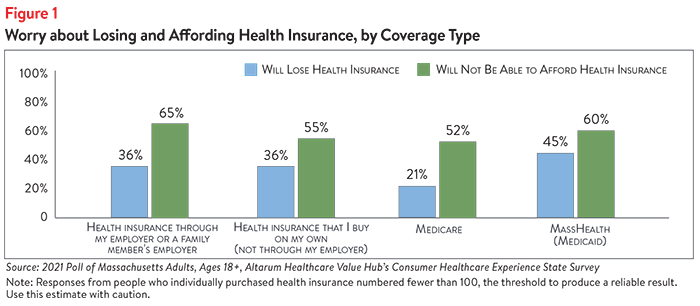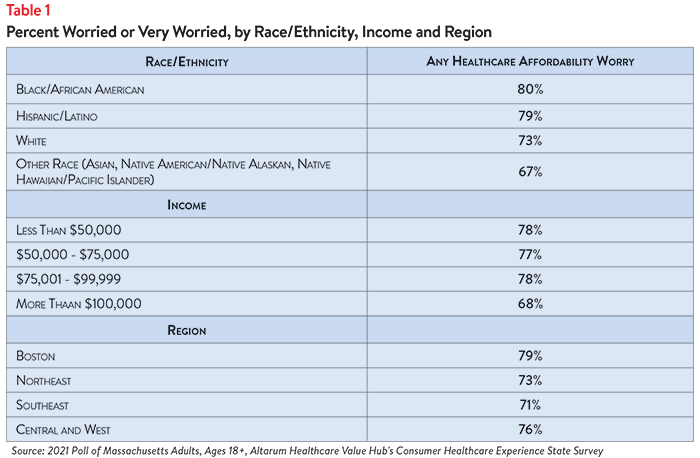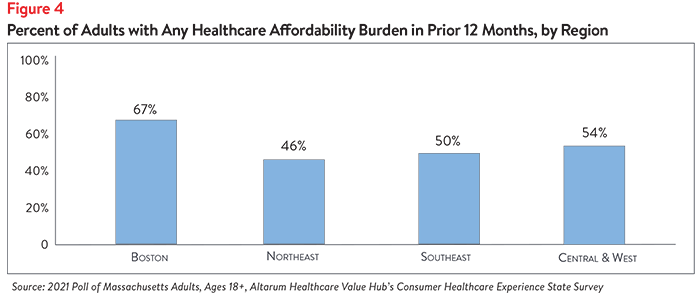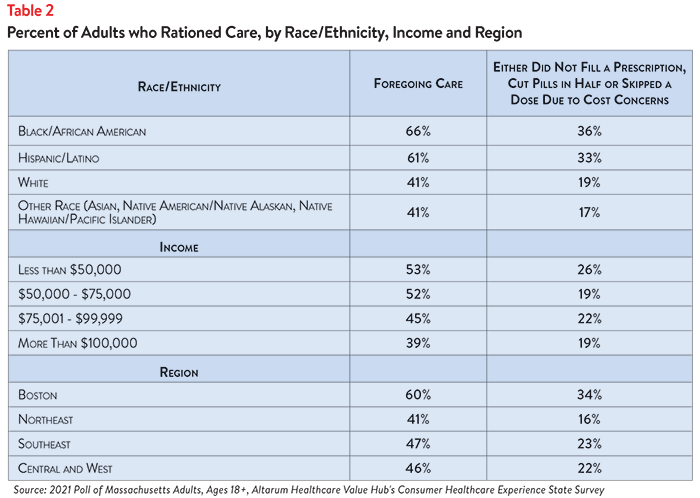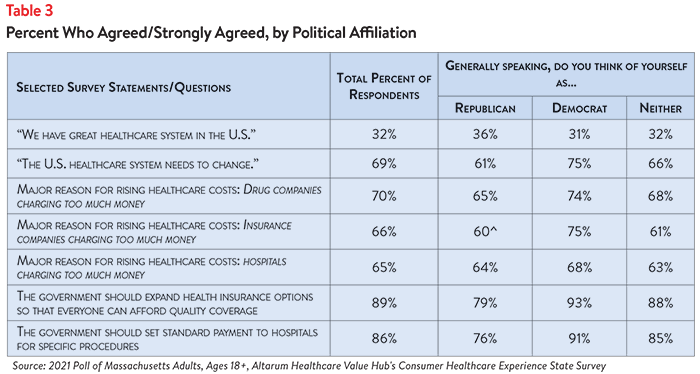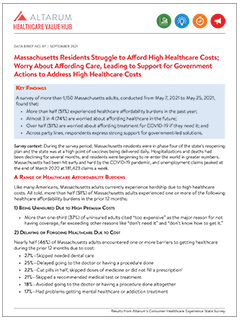Massachusetts Residents Struggle to Afford High Healthcare Costs; Worry About Affording Care, Leading to Support for Government Actions to Address High Healthcare Costs
Key Findings
A survey of more than 1,150 Massachusetts adults, conducted from May 7, 2021 to May 25, 2021, found that:
- More than half (51%) experienced healthcare affordability burdens in the past year;
- Almost 3 in 4 (74%) are worried about affording healthcare in the future;
- Over half (51%) are worried about affording treatment for COVID-19 if they need it; and
- Across party lines, respondents express strong support for government-led solutions.
Survey context: During the survey period, Massachusetts residents were in phase four of the state’s reopening plan and the state was at a high point of vaccines being delivered daily. Hospitalizations and deaths had been declining for several months, and residents were beginning to re-enter the world in greater numbers. Massachusetts had been hit early and hard by the COVID-19 pandemic, and unemployment claims peaked at the end of March 2020 at 181,423 claims a week.
A Range of Healthcare Affordability Burdens
Like many Americans, Massachusetts adults currently experience hardship due to high healthcare costs. All told, more than half (51%) of Massachusetts adults experienced one or more of the following healthcare affordability burdens in the prior 12 months:
1) Being Uninsured Due to High Premium Costs
More than one-third (37%) of uninsured adults cited “too expensive” as the major reason for not having coverage, far exceeding other reasons like “don’t need it” and “don’t know how to get it.”
2) Delaying or Forgoing Healthcare Due to Cost
Nearly half (46%) of Massachusetts adults encountered one or more barriers to getting healthcare during the prior 12 months due to cost:
- 27%—Skipped needed dental care
- 25%—Delayed going to the doctor or having a procedure done
- 22%—Cut pills in half, skipped doses of medicine or did not fill a prescription1
- 21%—Skipped a recommended medical test or treatment
- 18%—Avoided going to the doctor or having a procedure done altogether
- 17%—Had problems getting mental healthcare or addiction treatment
Moreover, cost was the second most frequently cited reason for not getting needed medical care, after difficulty getting an appointment. Cost was also more frequently cited than other barriers like transportation and lack of childcare.
Of the various types of medical bills, the ones most frequently associated with an affordability barrier were those associated with doctor visits, prescription drugs and dental services. The high prevalence of affordability burdens for doctor visits and prescription drugs likely reflects the frequency with which Massachusetts residents seek these services. Trouble paying for dental bills likely reflects lower rates of coverage for these services.
3) Struggling to Pay Medical Bills
Other times, Massachusetts adults got the care they needed but struggled to pay the resulting bill. More than 1 in 4 (26%) of Massachusetts adults experienced one or more of these struggles to pay their medical bills:
- 9%—Were contacted by a collection agency
- 9%—Used up all or most of their savings
- 9%—Were unable to pay for basic necessities like food, heat or housing
- 7%—Borrowed money, got a loan or another mortgage on their home
- 7%—Racked up large amounts of credit card debt
- 6%—Were placed on a long-term payment plan
High Levels of Worry About Affording Healthcare in the Future
Massachusetts adults also exhibit high levels of worry about affording healthcare in the future. Overall, 3 in 4 (74%) report being “worried” or “very worried” about affording some aspect of healthcare in the future, including:
- 63%—Cost of affording nursing home or home care services
- 61%—Medical costs when elderly
- 60%—Health insurance will become unaffordable
- 58%—Medical costs in the event of a serious illness or accident
- 53%—Cost of dental care
- 47%—Prescription drugs will become unaffordable
- 35%—Losing health insurance
While two of the most common worries—affording the cost of nursing home or home care services and medical costs when elderly—are applicable solely to an older population, they were most frequently reported by respondents ages 25-44. This finding indicates that residents may be worried about affording the cost of care for aging parents, in addition to themselves.
Furthermore, 35% of respondents of all ages are “worried” or “very worried” about losing their health insurance. These concerns vary by type of insurance coverage, with people covered through Medicaid and those with employer-sponsored insurance being most concerned about losing their coverage. Concerns about affording health insurance exceeded fears about losing coverage across all insurance types (see Figure 1). Across every insurance type, over half of respondents are “worried” or “very worried” about not being able to afford health insurance in the future.
In addition to affordability worries, Massachusetts residents were asked about their top worries related to the COVID-19 crisis.2 When asked about “affording treatment of coronavirus/COVID-19 if you need it,” 51% of respondents reported being somewhat or very worried.
Worry About Affording Healthcare in the Future Varies Across Racial/Ethnic Groups and Income Levels
Black/African American and Hispanic/Latino residents, people with household incomes of less than $100,000 per year and people living in the Boston region are most worried about affording coverage and care (see Table 1). It is important to note, however, that large percentages of respondents in all other groups report being “worried” or “very worried.”
Differences in Healthcare Affordability Burdens
The survey also revealed income differences in how Massachusetts adults experience healthcare affordability burdens.
Affordability burdens affect families quite far up the income ladder, with almost half (42%) of residents with household incomes of $100,000 or more struggling to afford healthcare in the past 12 months (see Figure 2). Massachusetts residents earning less than $50,0003 face the greatest burden, with 61% reporting affordability problems.
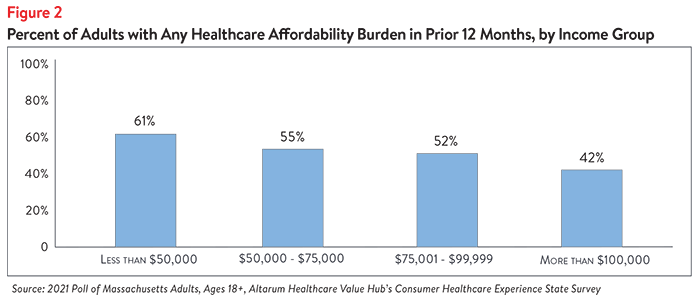
Given the evidence surrounding health disparities in the U.S., it is unsurprising—but troubling—that Massachusetts residents who identify as Black/African American and Hispanic/Latino are most likely to have experienced at least one healthcare affordability burden in the last 12 months (see Figure 3).
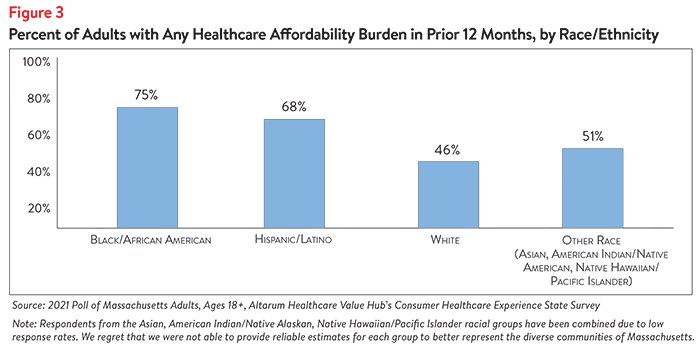
Additionally, residents of the Boston region most frequently report healthcare affordability burdens, likely contributing to higher rates of forgoing needed care (see Figure 4 and Table 2). Still, large percentages of respondents in all other Massachusetts regions report healthcare affordability problems and rationing their care.
Dissatisfaction with the Health System and Support for Change
In light of these healthcare affordability concerns, it is not surprising that Massachusetts residents are extremely dissatisfied with the health system. Statewide:
- Just 32% agreed or strongly agreed that “we have a great healthcare system in the U.S.,”
- While 69% agreed or strongly agreed that “the system needs to change.”
Massachusetts residents see government as the key stakeholder that needs to act to address health system problems. Moreover, addressing healthcare problems is a top priority that Massachusetts residents want their elected representatives to work on.
At the beginning of the survey, respondents were asked what issues the government should address in the upcoming year. The top vote getters were:
- 58%—Healthcare
- 57%—Economy/Joblessness
- 37%—Taxes
The economic woes brought on by the COVID crisis likely contributed to “Economy/Joblessness” as a primary concern, but addressing healthcare remains the top priority for Massachusetts adults.
When asked about the top three healthcare priorities the government should work on, top vote getters were:
- 47%—Address high healthcare costs, including prescription drugs
- 38%—Get health insurance to those who cannot afford coverage
- 36%—Preserve consumer protections preventing people from being denied coverage or charged more for having a pre-existing medical condition.
Of more than 20 options, Massachusetts adults believe the reason for high healthcare costs is unfair prices charged by powerful industry stakeholders:
- 70%—Drug companies charging too much money
- 66%—Insurance companies charging too much money
- 65%—Hospitals charging too much money
When asked about “Expanding health insurance options so that everyone can afford quality coverage,” 89% of respondents agreed or strongly agreed with this policy as a means of improving affordability, with high levels of support across party lines. In addition, 86% of respondents agreed or strongly agreed with the policy option, “Set standard payment to hospitals for specific procedures.”
Support for Action Across Party Lines
There is also remarkable support for change regardless of respondents' political affiliation (see Table 3).
The high burden of healthcare affordability, along with high levels of support for change, suggest that elected leaders and other stakeholders need to make addressing this consumer burden a top priority.
Notes
1. Of the current 46% of Massachusetts adults who encountered one or more cost-related barriers to getting healthcare during the prior 12 months, 16% did not fill a prescription, while 13% cut pills in half or skipped doses of medicine due to cost.
2. COVID-19 is the disease caused by the coronavirus, which was characterized as a pandemic by the World Health Organization on March 11, 2020. For a comparison of how respondents from Connecticut, Kentucky, Mississippi and NewJersey answered our COVID questions, please see Healthcare Value Hub, How COVID Has Shaped Residents' Broader Attitudes Towards the Health System, Data Brief No. 86.
3. Median household income in Massachusetts was $81,215 (2015-2019). U.S. Census, Quick Facts. Retrieved from: U.S. Census Bureau QuickFacts: Massachusetts
Methodology
Altarum’s Consumer Healthcare Experience State Survey (CHESS) is designed to elicit respondents’ unbiased views on a wide range of health system issues, including confidence using the health system, financial burden and views on fixes that might be needed.
The survey used a web panel from Dynata with a demographically balanced sample of approximately 1,250 respondents who live in Massachusetts. The survey was conducted in English or Spanish and restricted to adults ages 18 and older. Respondents who finished the survey in less than half the median time were excluded from the final sample, leaving 1,158 cases for analysis. After those exclusions, the demographic composition of respondents was as follows, although not all demographic information has complete response rates:
